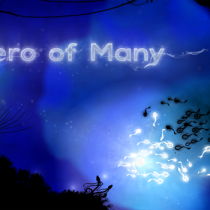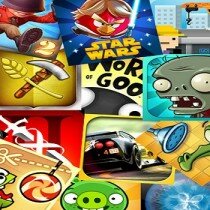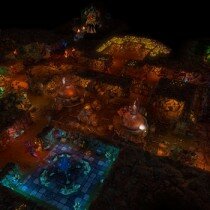You probably haven’t heard of Opoona, a very Japanese RPG released exclusively for the Wii. There is a very good reason for this. The brains behind this game decided that it would be a good idea to release this engrossing adventure on the same day as Super Mario Galaxy, possibly the most highly anticipated Wii game ever. Consequently, Opoona was plunged into darkness, and sat sulkily in the shadow of the pudgy plumber’s galactic adventure.
It’s a shame that the developers committed commercial suicide, because Opoona is definitely one of my favourite Wii games. It’s full of idiosyncratic charm and charisma and manages to create an interesting planet with simple graphics and no voice acting. You play a ‘Tizian’ child called… wait for it… Opoona! Whilst on a family holiday, the spaceship you’re travelling on is attacked by a mysterious unknown power who forces the ship to crash into the planet ‘Landroll’. Your mother and father, Momeena and Dadeeena respectively, are in the space equivalent of intensive care and your siblings are sent off to different cities. Alone and with little choice, you enrol in the local school ‘Starhouse’ and embark on an adventure to seek a way to help Momeena and Dadeena, whilst seeking out your siblings, aiding the people around you and completing many, many menial tasks.

Opoona is a chubby, bald, round-headed child with a bon-bon floating about five inches from his head. He throws said bon-bon at enemies to attack, and can improve it by levelling up or altering it with items. The game employs a combat system that is a subtle blend between turn-based and real-time combat which is used in so many JRPGs nowadays. It does have another combat mechanic in which you have to charge up your bon-bon attack and release it at the correct point to do more damage, but it’s so easy to master that before long you’ll be flinging your bon-bon expertly without even trying like a nonchalant, maniacal sweet-shop owner.
Apparently in space bureaucrats rule with an iron fist, so consequently the game revolves around acquiring licenses. On his arrival on Landroll, Opoona is forced to undertake training as a Landroll ranger, and is charged with the protection of the planet’s citizens. This might seem straight-forward enough, but on his journey Opoona will acquire farming licenses, mining licenses, fast-food licenses and even a licence that proves he’s a qualified hotel valet. Although many of the licenses are optional, rewarding in money which can be spent on upgrading your floating bon-bon, the story will force you to acquire a range of licenses. Many of them revolve around quirky mini-games, some of which are fun and some of which are obnoxious, such as the hotel valet mini-game in which you have to take an order for room service, memorize it, organise it (a bit of sushi here, a bit of green tea there) and then carry it up to the room. However, if anyone so much as brushes past your chubby little shoulders, Opoona will throw the room service all over his face, meaning you have to go back and repeat the order. FUN FUN FUN!

Acquiring licenses does have a strange addictive quality to it which adds depth to the gameplay, but it does bring any flow the story has to a shuddering halt. A podgy little alien boy forced to work to buy treatment for his hospitalised parents is less the stuff that legends are made of, and more like something Charles Dickens would write after watching a Star Trek box set. The story lacks excitement in the first place, but whatever little intrigue it has is bulldozed by countless license-orientated side-quests. If I read the plot synopsis out-loud, sparing no details, it would probably take up five minutes of your time. Stretching this to almost thirty hours of gameplay means that although the game is full of charm and enjoyment for the first half, it severely stagnates towards the end. If Opoona was twelve hours long, it would be a fantastic game.
Most of the cities have a very similar complexion. Tokione, the city Opoona finds himself in at the start of the game, looks interesting and remarkable. The second city, Lifeborn, looks slightly less interesting and remarkable. The third city… well, you can see where this is going. There isn’t a vast amount of variation between environments, and as you traverse the six cities, you’ll come to the strange revelation that they all look like airports. Once this occurs, the space-cities lose their wonder and become a rather bland backdrop to plod through in-between side-quests.

The game has a fairly arbitrary ‘friendship’ feature, in which Opoona develops his relationships with the people he encounters on his journey. It doesn’t really affect gameplay and it doesn’t really offer any benefits so personally, I don’t see the point. It’s most likely trying to tell its target audience, which is probably eight to twelve-year olds, that friendship is cool and important! Maybe it’s because I’m jaded, but I couldn’t care less about maintaining my relationships with real people, never mind NPC’s, particularly when they barely have a personality.
I think I have shown that Opoona has many flaws, but they do not detract from the overall enjoyable experience. It’s a shame that this game was completely overlooked, because I believe there is a lot of fun to be had here, collecting licenses, tossing your bon-bon and whizzing around the cities on your hover board (I forgot to mention, you get a hover board). It’s too long but it’s addictive. It’s shallow but it’s entertaining. For what it’s worth, I really liked it, and I wrote this article to shine a little light on an original game that desperately needed some light shone upon it on release day. Better late than never I suppose.
© 2013 – 2014, zero1gaming.com. All rights reserved. On republishing this article your must provide a link to this original post
About Joseph Butler-Hartley
A jaded horror enthusiast, I get my kicks hiding in cupboards from whatever hideous creatures happen to be around. However, I'm more than happy playing a wide range of genres on both consoles and PC. Apart from writing for Z1G, I'm also a History student.
•




